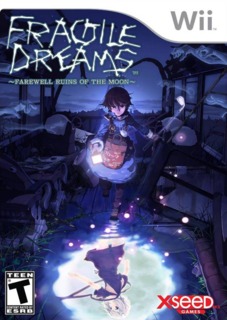Fragile Dreams: Farewell Ruins of the Moon has its share of faults, but they are far eclipsed by what it does right.
Probably Fragile Dreams' greatest strength, which forms as good a place as any to start, is its story. Its premise is a very interesting one: you play as Seto, a boy who lived with an old man until that man's death, and who is now all alone now that that man has passed away. The setting is Earth, yet at the same time it is not the Earth as we know it, as all the humans have long since disappeared, leaving behind a world in grave disrepair. The reason for their disappearance is one of the central plot points in the story, and it's not until very late in the game that any explanation is forthcoming. After departing the home in which he lived with the old man, he comes across a silver-haired girl, whom he then must pursue, as it shatters his impression that he is the only human left on the planet. Thus his journey begins.
The thing that I liked the most about the game was the way in which it quite simply knows what it is, and what it isn't, and has no bones about proudly being what it is even if the alternative might have been a more commercially popular venture. Its primary function is to tell a story, and this it does to great effect, as it quite thoroughly sucked in this reviewer as he played. There are a number of questions that are raised throughout the game, and the extent to which one enjoys the game will almost assuredly be directly proportional to the extent to which one cares about the answers. I absolutely wanted to find them, and found myself extremely emotionally engaged; however, one who isn't so keen on doing so will probably find the game substantially more along the lines of a chore.
The combat in the game has been critically panned, and to a certain extent I believe that this is certainly justified. It isn't very complicated; there are four types of weapons - melee, ranged, pole, and heavy - and one combats enemies more or less by simply either pressing A or pressing and holding A. There are a few enemies that are only vulnerable to attack at certain points, but beyond that there is not much strategy involved. Experience is gained by defeating enemies, and this experience contributes to levels up, which increase your HP and attack (which are the only two stats in the game).
If one is familiar with games such as Zelda, in which combat is extremely tight and is one of the primary points of focus, one will surely be disappointed if one expects the same from this game. At the same time, however, I feel that critics have been too harsh on the combat. It is primitive and rudimentary, to be sure, but at the same time it is still most certainly functional. The extent to which the existing combat felt reasonably polished - though primitive, it did not give an impression of being unfinished - gave this reviewer the impression that the combat was purposefully designed in the way that it was, so that it would be present, but would not distract from the story and the atmosphere too greatly. Viewed in this respect, I felt that the combat was, like the rest of the game, quite as it should be, even if it is not what critics would like it to be.
Bolstering the story is a rather large series of collectible items that are strewn throughout the land to be picked up and examined at fire pits (which pull triple duty, being simultaneously save points, HP restoration points, and a place where one can purchase or sell items). These are little trinkets - origami cranes, coffee mugs, etc. - which were owned by denizens of Earth who have since left. Collecting them allows the player to hear the thoughts and words of those who owned them. Although none of these ever spill the beans entirely, many of them provide smidgens of insight here and there regarding the way in which the world met its end, and even those that don't tend to be interesting enough to read and listen to in their own right.
Fragile Dreams is also a very, very beautiful game, and not just graphically. The extent to which the designers managed to craft a world that not only looks but also feels deserted and lonely is quite marvelous. The game uses music - or the lack thereof - and sound quite effectively to increase tension in the player. The game is completely quiet when there are no enemies around, but the moment Seto comes near an enemy, an off-tone piece of music begins to pick up, setting the tone of the battle to come; this reviewer found this tactic quite effective in terms of putting him on edge while playing the game.
But now, at last, we reach the bottom line: should you get this game? If the premise of the story does not interest you, and if you're used to games which have exciting combat, then the answer is most assuredly no; this game will not appeal to such a person. If, on the other hand, the premise makes you want to pursue it further, and if the relatively primitive combat in the game is not what you would consider a deal-breaker, then I would consider this game absolutely recommended. It is, in this reviewer's opinion, most definitely an underrated gem which he is glad to have in his library.

